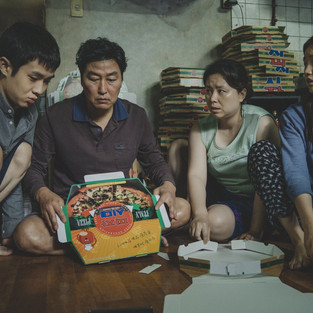Column: "Parasite" Makes History at the Oscars and the Box Office
- Jennifer Green

- Feb 13, 2020
- 3 min read
Updated: Mar 31, 2022
In the days leading up to the Oscars each year, trade magazines and newspapers like the L.A. Times run anonymous opinions from voting members of the Academy of Motion Picture Arts and Sciences about the films nominated for the industry's top awards.
This year, The Hollywood Reporter published the "brutally honest" reflections of one unnamed actress who had this to say about Bong Joon-ho's "Parasite," the South Korean film nominated in six Oscar categories including best picture: "I don't think foreign films should be nominated with the regular films."
It was a shockingly candid display of ethnocentrism, and in case the snub wasn't clear enough, she added of the best director category: "I want an American director to win. The Oscars is an American thing."

"Parasite" made history on Sunday night by beating back the Oscars' established bias against "foreign" films to win not just best international feature but best director, best original screenplay and - plot twist - best film.
It was the first time in the awards' 92 editions that a film not shot in English took home the best film Oscar. Think about the thousands of movies made around the world every year, and let that soak in.
"Foreign" Films
A handful of films paved the way for "Parasite's" big night.
A dozen previous foreign-language films have been nominated for the best film Oscar, mostly from Western Europe but also two from Mexico ("Babel" and "Roma," both US co-productions) and the Mandarin-language "Crouching Tiger, Hidden Dragon" (also a US co-production).
When "Roma" director Alfonso Cuarón won best director last year, he quipped he too had grown up (in Mexico) watching "foreign-language films" such as "Citizen Kane," "Jaws" and "The Godfather."
Really, does there exist a more subjective word than "foreign"?
The Academy admitted as much this year by changing the name of the foreign-language category to "international," but it's still rife with issues, from the disqualification of films in English even from countries where it's an official language, to the iffy motives of some nominating bodies abroad, to the definitions of nationality in multi-country co-productions.
Bong himself told Vulture last fall in an interview: "The Oscars are not an international film festival. They're very local."
The Oscars answered back on Sunday.
Critical Darling
So, why "Parasite"?
Buzz is a factor. The film was already one of the year's most talked about outside the US, starting with its top Palme d'Or win at the Cannes Film Festival last May, a first for a Korean film, and continuing with rave reviews, other major awards and box office records around the world (more than $165 million earned globally to date).
In the US, its success offers hope that audiences are learning to accept the subtitle. "Parasite" is already among the top-grossing foreign-language films of all time here. HBO is reportedly in early stages of developing a series based on the film.
Reputation is another factor. Bong is known to fans worldwide for his previous films, a mix of Hollywood and Korean genre hits that often tackle social injustices, like "The Host," "Snowpiercer" and Netflix's "Okja."
He's that rare blend of commercial auteur – a director whose films are personal and unique but who also work in genres and styles appreciated by mass audiences.
"Parasite" was distributed in the US by Neon
Class Warfare
"Parasite" is no different. The film starts out in the cramped basement flat of a poor family, a good-natured foursome squeezing into corners to connect to other people's wi fi, scrounging for odd jobs and eating whatever they can afford. Their fate is visualized in their street-level window that lets in disturbing sights, sewer water and fumigation sprays, but no direct sunlight.
The struggle gives the two grown children their grit. When a friend asks the son, Ki-woo, to pose as a college student to tutor a rich girl in English, he slides perfectly into their world, headquartered in a spacious architectural masterpiece of a home, schmoozing the girl's mom and plugging his family members anonymously into other household jobs.
There's a gentle humor in the contrast between rich and poor at first. Seen through the scamps' eyes, everything represents opportunity and benefit.
But just when Bong has lulled you into thinking this is only satire, the film takes a very dark turn. Class contrasts morph into rage as South Korea's mutually-parasitic social layers clash in proximity.
After a singular dramatic event in the film, Ki-woo's father tries to explain to his son the senselessness of making plans, especially for the disempowered. When Bong ends the film with the boy doing precisely that, you can't help but feel a mix of empathy, hope and futility – probably exactly what Bong intended.
"Parasite" is available on DVD and streaming platforms.
This column originally ran in The Daily Record.






Comments